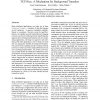Free Online Productivity Tools
i2Speak
i2Symbol
i2OCR
iTex2Img
iWeb2Print
iWeb2Shot
i2Type
iPdf2Split
iPdf2Merge
i2Bopomofo
i2Arabic
i2Style
i2Image
i2PDF
iLatex2Rtf
Sci2ools
OSDI
2002
ACM
2002
ACM
TCP Nice: A Mechanism for Background Transfers
Many distributed applications can make use of large background transfers ? transfers of data that humans are not waiting for ? to improve availability, reliability, latency or consistency. However, given the rapid fluctuations of available network bandwidth and changing resource costs due to technology trends, hand tuning the aggressiveness of background transfers risks (1) complicating applications, (2) being too aggressive and interfering with other applications, and (3) being too timid and not gaining the benefits of background transfers. Our goal is for the operating system to manage network s in order to provide a simple abstraction of near zero-cost background transfers. Our system, TCP Nice, can provably bound the interference inflicted by background flows on foreground flows in a restricted network model. And our microbenchmarks and case study applications suggest that in practice it interferes little with foreground flows, reaps a large fraction of spare network bandwidth, an...
Background Transfers | Background Transfers Risks | Large Background Transfers | Operating System | OSDI 2002 |
| Added | 03 Dec 2009 |
| Updated | 03 Dec 2009 |
| Type | Conference |
| Year | 2002 |
| Where | OSDI |
| Authors | Arun Venkataramani, Ravi Kokku, Michael Dahlin |
Comments (0)

